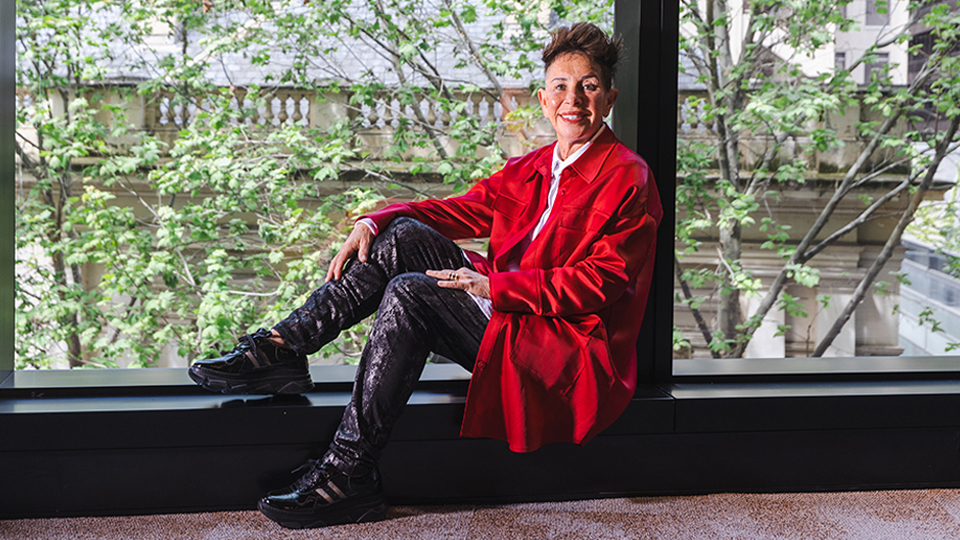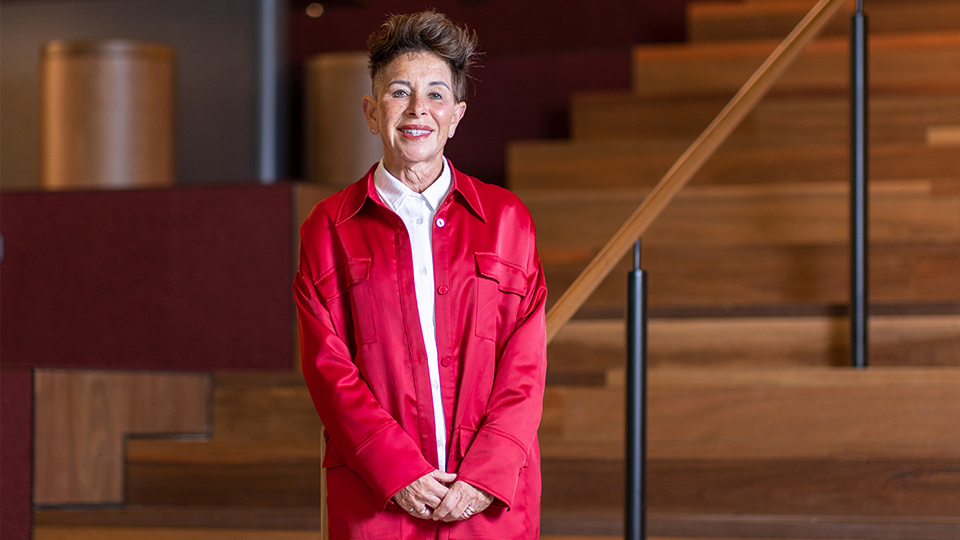Leadership at every level: a Q&A with Dr Andi Diamond
Each year, Victoria University invites a leading executive to join us for a week. In 2022, we have been lucky to have Dr Andi Diamond, CEO, City of Monash, 2021 VU Lifetime Achievement Award winner, and chair of Victoria University Business School’s Industry Advisory Group, as our Executive in Residence.
It’s a unique platform, making it possible for students and staff to connect with an experienced CEO on campus. And the learning and inspiration can extend both ways.

Q&A with Dr Andi Diamond
We caught up with Andi to ask about her experiences at VU, and learn about her trajectory from student to CEO.
As an MBA, and a Doctor of Business Administration (DBA) postgraduate student – both at VU – how did those study experiences shape your career and where you are today?
Interestingly, I started a Masters at Monash University and I moved jobs to Melton and it was much easier to go to VU, so I am so pleased I did. It was only the last few subjects I needed to do but I got a sense, even then, more than 25 years ago, VU really focused on content that was applicable to business and employment.
The DBA was just the most wonderful experience and my focus for my thesis was looking at Gender and Leadership in Local Government, and, doing that DBA did open doors. It certainly gave me opportunities I don’t think I would have had otherwise.
What does the VU Business School industry advisory panel involve and what is your role like, as chair?
Essentially we represent business, a fairly broad range. We’ve got IT, logistics, education, energy, local government. We’ve got a number of CEOs and external researchers. And our role is to assist the VU Business School in reviewing course content.
Is it about skills gaps in industry, or about themes and challenges that you’re seeing emerging?
A whole range of things. Recently we looked at the Bachelor of Business. And it is about, what do people come out with, what are their skills? And also recognising that people might do an undergraduate degree and that’s it. So one of the questions we’ve asked is, where is leadership training occurring, at what level? Because we think, increasingly now, post pandemic, people are not coming to [industry] with a significant range of qualifications, and are looking for leadership roles much earlier.
Do you think people are ready for those leadership roles at that stage in their career? Is it about getting those skills when you are starting out?
There is one thing that COVID has taught us, and that is, leadership can occur at any level. In our case, [at Monash City Council], we have had an incident control group that has pretty much managed the whole way we work through COVID. It is made up of junior staff through to senior staff, each with an equal voice in those meetings, providing advice to the executive, and we have taken that advice. So, I am a firm believer in, start looking at leadership from a very young position.
And [at VU], students having access to your peer career advisors, these are people at the start of their work and studies with the most extraordinary life experiences. And I would say, they are leaders.
And what skills do those student peer careers advisors bring? What do you see as being a leadership skill?
I think the first thing is about communication. It is about teamwork. So, for young emerging leaders, absolutely about teamwork, absolutely about contributing. And always about resilience.
And having meet some of your peer career advisors, there are students here who have been faced with so many unbelievable challenges. And you look at their resilience and their capacity to take the next step. There is nothing more inspirational.
In your week as Executive in Residence, have you had the opportunity to meet a lot of people from across the university? What’s your week been like?
I have been getting used to uni culture. It’s been a long time since I have been on a campus for more than a meeting. So, just really focusing, on what’s the culture? What’s it like being a student? And sitting down and chatting to students.
The more formal parts have involved a webinar with the Vice Chancellor Professor Adam Shoemaker, getting to understand the things important to him. I have done some guest teaching, which was fabulous, being back in a classroom in a different way. I was part of a panel session responding to an academic paper on local government. I have sat in on research projects, planning meetings, met with VU Employ, and that is something that I will hold onto for a very long time.

What did you enjoy in particular about meeting with the VU Employ team?
Seeing the offerings that they have for students, alongside the student’s formal learning, just wonderful applications. It does seem like a large number of students at VU are working and studying, so the very real experience students are getting with preparing a resume, getting that first opportunity at work and looking at what further opportunities there are. So, blown away.
As you wrap up your week, do you think that there are opportunities for industry to get even more engaged?
I think there is. And seeing the co-location, and the start of it, the flipped campus model, hearing some of your plans, the formal strategy, and partnerships with industry. I think all of those are absolutely fantastic, absolutely crucial for students to have access to business.
And I know the connection VU has with local government in the west is exceptional. And that sort of model, I don’t think is replicated anywhere else. VU is positioned in the community and for the community.
Going to your role as CEO of City of Monash, and your experience as a business leader. Local government is a specific type of business, what business skills are useful to build a career in local government?
Where I am is in the east, is at the City of Monash. We’ve got a population of over 200,000 people living in 76,000 homes. We’re responsible for about $2 billion worth of assets, including 670kms worth of roads, more than 500 buildings, we provide local support to community. From engineering to garbage collections, to city development, city design – a huge scope of programs.
We do run as a business, we need to be financial, we do get a large proportion of our revenue through rates, fees and services, and government grants, but we run a number of businesses that compete with the private sector and are very much market driven. For example, we run golf courses, gyms, swimming pools. So, you need business skills and also to be prepared for a significant level of governance, compliance and legislation.
But I highly recommend working in local government, it has kept me engaged for the last 30 years.
Finally, and it feels a bit odd to tack it on at the end, but I was going to ask you, in your opinion, where is the best coffee on campus?
I absolutely loved the Reading Room Café at Footscray Park Campus. It was really lovely there.